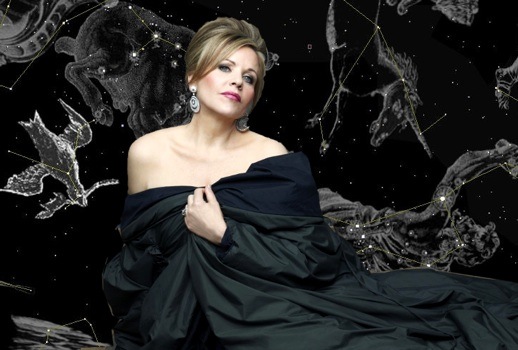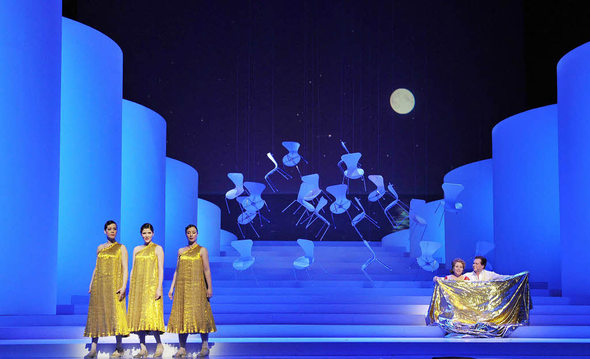
I have a high opinion of Fleming, especially in Strauss. There are historical reasons for this, and they begin with a 1995 performance of Rosenkavalier at the Houston Grand Opera, conducted by Christoph Eschenbach and starring Fleming, Dawn Upshaw, and Suzanne Mentzer. It was my first Strauss opera and the first time I had heard any of these singers live.
What an introduction to Strauss! My strongest memory is of the trio. As Fleming started to sing the opening phrases, the world seemed suspended, replaced by the fullness of this moment of music. It wasn’t just those redolent Straussian chords (which, to this day, heard anywhere, stir in me feelings of nostalgia). It was also Fleming’s performance. Her voice swelled in sound and intensity as she turned, slowly, away from the young lovers and toward the audience. It was a gesture, vocally and dramatically, that was at once beautiful and heart-breaking. In that instant, I could feel my appreciation of opera shifting to a higher gear.
That performance, along with her excellent Arabella in 1998 (also with HGO), left in me a store of goodwill toward Fleming that no number of jazz-inflected “Over the Rainbow”s could possibly deplete.
But in explaining my bias here, I guess I could have dispensed with all the above and noted the obvious: I travelled from New York to Baden-Baden to see her debut the role.
In the event, her performance was a success, if a qualified one. Many will wonder if her voice is big enough for the role. In a way, this is an unfair question, since the “right” size may have more to do with one’s own preferences than it does the nature of the role. If your ideal for Ariadne is a dramatic sound, then you may be disappointed to hear any lyric soprano in the role, including Fleming. Her voice, for all its qualities, lacks the orchestra-slicing ease that Voigt, for example, brought to the part in her prime.
As Fleming herself noted in a recent interview: “People have expectations of a heavier voice as Ariadne. I wanted to sing it in the style of Gundula Janowitz and especially Lisa Della Casa.” Alas, I never heard Janowitz or Della Casa live, but my sense from recordings is that their voices, especially Janowitz’s (and Schwarzkopf’s, too, for that matter), while lyrical, had a brighter quality and a more penetrating edge than Fleming’s softer-grained voice.
On Saturday night, she started tentatively, sounding somewhat under-powered and a bit self-conscious. One could sense her effort gearing up for phrases, particularly towards the end of “Es gibt ein Reich.” My suspicion, given how she improved through the night, is that this may have had more to do with opening night nerves than the innate qualities of her sound or the volume she’s able to produce. Even in these more tentative moments, she remained audible over the Staatskapelle Dresden orchestra, which, apart from a series of unfortunate horn entrances, played beautifully under Christian Thielemann (the same conductor who accompanied Fleming in the excellent Ariadne excerpts that filled out her 2008 studio recoding of Strauss’s “Four Last Songs”).
Whether it was an acting choice, her voice warming up, or some combination, Fleming’s self-consciousness faded as the opera progressed. The layers of opera singer playing the prima donna playing Ariadne seemed to collapse into a more integrated performance, just as the opera buffa interruptions subsided and the opera within the opera became the thing itself. The voice sounded rapt, in a death-wish, as she wondered aloud if Bacchus was Hermes, “the messenger of all messengers” (“du Bote aller Boten”). And she delivered a big, excitingly urgent sound in the phrase “Take me!” (“Nimm mich!”), pleading him to take her away on his ship. These are just examples. The entire duet was beautifully, often thrillingly, sung.
In the role of Bacchus, surely one of the most thanklessly difficult tenor roles, the American Robert Dean Smith managed to bring some elegance and (relative) ease to an unwieldy part. Although his tone is somewhat monochromatic, it was a pleasure to hear someone sing the role without worrying if he’ll be able to finish it. I thought he sounded better live, in fact, than he did on the (very good) recent ENO recording with Christine Brewer as Ariadne.
As Zerbinetta, the Canadian soprano Jane Archibald was spectacularly accurate in pitch and note-to-note delineation in the role’s many florid passages, and she sang and acted with disarming confidence. Even though all the notes seemed well within her compass, her voice thinned to a fraction of its size in some (but not all) of the highest-lying passages of “Großmachtige Pinzessin.” In all, though, it was an impressive performance from a young singer who will no doubt improve in the years to come.
As the composer, the French mezzo-soprano Sophie Koch received the loudest applause from the opening-night audience, and deserved it. Acting wonderfully as a young man (although with a wig that distractingly reminded me of Malcom Gladwell’s wild mop), she sang with total commitment and full-voiced vigor throughout the wide range of the role. It’s no small compliment to say she reminded me of Suzanne Mentzer. Why doesn’t Koch sing more in New York?
The nymphs were all very good (particularly the Dryad of Rachel Frenkel), and the other parts were handled ably. It’s worth noting that the speaking part of the Majordomo was played by the German tenor, René Kollo.
The production itself, directed and designed by Philippe Arlaud, was a disappointment. The set consisted of a center staircase with undulating walls to each side, all without texture and in the brightest white, with three red lamps suspended over the center of the stairs (looking like heat lamps on a food line). The set’s starkness was presumably meant to reflect the desolateness of Naxos, and to frame one of the production’s most insistent ideas, associating color with the mood and vitality of the characters. Zerbinetta and company are in bold, bright colors, while Ariadne and Bacchus are in black and white. Near the end of the opera, as Ariadne is stirred from her despondency, she sheds her black gown to reveal a dress of the brightest red. You get the idea.
The low point of the production occurred when the Minotaur arrived (?), dragging Ariadne across the stage atop a large gold-colored cloth. (For those of you who may not remember the Greek myth and backstory to the opera, Ariadne was abandoned on Naxos by Theseus, after she had helped him defeat to the Minotaur on Crete.) If there was a point to this awkward stage business, I missed it entirely.
The ending provided the production’s best moment, when the play-within-a-play concept gave way to the music. Throughout the performance, the space at the top of the stairs had been occupied by stiff onlookers (the men in black tie, women in pale green) depicting the “real world” audience at the house of the “richest man in Vienna,” where the opera is being staged. As the music culminates in the final duet, the crowd disperses and their chairs rise gently into the sky, amidst the projected images of fireworks—referring back to the prologue, when the Majordomo announces that the opera must be completed before the scheduled fireworks display. It was a decent idea, if poorly executed; the projections, for instance, looked washed-out and amateurish).
You don’t need to take my word on any of this The Blu-ray/DVD will no doubt be coming soon. The house was lined with HD cameras, and I suspect they’ll be filming all three nights to splice together the best of the week’s performances.
(Production photo: Kremper)



